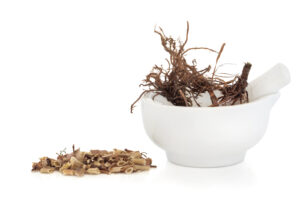Medical Disclaimer: The following content should not be used as medical advice or as a recommendation for any specific supplement or medication. It is important to consult your health care provider prior to starting a new medication or altering your current treatment.
Valerian root comes from the valerian plant, which has been used for thousands of years for various medical purposes, including to enhance sleep. While it has not been studied extensively, valerian root is often marketed as a type of natural sleep aid.
Since a significant number of Americans regularly lose sleep and may experiment with sleep-enhancing substances, it can be helpful to understand what is and isn’t known about natural sleep aids. We discuss the scientific evidence regarding valerian root for sleep, as well as key safety and dosing issues.
What Is Valerian Root?
Valerian root is an extract derived from the Valeriana officinalis plant, which can be found in different parts of Europe, Asia, and North America.
Medicinal use of valerian root dates back to ancient Greece. Since its ancient origins, the plant has been touted as a treatment for a range of ailments, including:
- Insomnia
- Anxiety and stress
- Headaches
- Stomach aches
Valerian root dietary supplements often come in the form of capsules or tablets that contain an extract of dried plant material. Valerian root is also available as a tea and a tincture. Some dietary supplements contain a mixture of valerian root and other substances.
Does Valerian Root Help You Sleep?
Research to date is inconclusive about whether valerian root can help your sleep. Although this plant has been in use for thousands of years, few rigorous scientific studies have examined its effects on sleep quantity or quality.
Anecdotally, however, some people report that taking valerian root supplements helps them fall asleep faster at night. Researchers know that valerian tends to act like a sedative, which may make people feel more calm or sleepy.
That said, few well-designed studies have taken place, and much of this research has produced inconsistent findings. One comprehensive report closely analyzed dozens of studies about valerian root extract and found conflicting results. Some studies determined that valerian root extract improved sleep, while other studies found no effect.
One possible explanation for these inconclusive results is a lack of consistency among valerian supplements. The valerian plant contains many compounds, and researchers still don’t fully understand which ones are responsible for its effects. Depending on their preparation and storage, different supplements can contain varying levels of these potential active ingredients.
Because the existing evidence is unclear, more studies will have to be conducted to get a better understanding of this plant’s effect on sleep. However, it’s worth noting that the American Academy of Sleep Medicine, a leading authority on treating sleep disorders, does not recommend using valerian root to treat chronic sleep problems.
How Valerian Root Affects the Brain
Medical experts still don’t know exactly how valerian affects the brain. Researchers have identified many compounds in valerian root, and several of these compounds may function together to give the plant a sedative effect.
Although researchers don’t yet completely understand the mechanism of valerian root’s effects, they believe it affects certain sleep-related pathways in the brain.
- GABA signaling: Valerian root contains compounds that may affect the brain’s GABA signaling pathway. GABA signaling has an important role in sleep because it helps determine whether the brain is in a calm or excited state.
- Serotonin: This molecule acts on the brain to regulate both mood and sleep. Compounds in valerian root may affect serotonin receptors found in regions of the brain that are important for sleep.
- Adenosine: Adenosine is a compound that helps control when people feel tired. Researchers theorize that compounds in valerian root may interact with adenosine receptors in the brain to promote sleep.

Is Valerian Root Safe?
Medical experts generally consider valerian root to be safe for short-term use up to one month. As with melatonin and other common dietary supplement sleep aids, researchers are still working to understand the long-term safety and health effects of valerian root.
There is no dependable scientific evidence about whether valerian root is safe for people who are pregnant or breastfeeding. Additionally, most dietary supplements have not been studied in young children.
Another possible safety concern is inconsistent labeling. The FDA doesn’t regulate dietary supplements as tightly as prescription medications, and labels may not always accurately reflect the dosage or composition of dietary supplements. In general, it’s best to look for valerian supplements from a trusted manufacturer.
Anyone considering using valerian root extract for sleep should first consult with their doctor, who can give tailored medical advice about its safety in their specific situation.
Valerian Root Benefits
Because scientists have not rigorously tested valerian in research trials, the benefits of valerian root are still up for debate. Some studies have shown that valerian root may help boost sleep quality, but other studies have found valerian to offer only limited benefits.
Valerian root’s purported benefits extend beyond sleep to a number of other health issues.
- Anxiety: One traditional use of valerian is for stress reduction. Some of the plant’s compounds may have anti-anxiety effects, but completed studies using valerian root extracts for anxiety have had mixed results.
- Obsessive-compulsive disorder: Obsessive-compulsive disorder (OCD) causes persistent, unwanted thoughts and repetitive behaviors. Although far from definitive, one study showed that valerian alleviated the symptoms of OCD.
- Hot flashes: People going through menopause often experience hot flashes, which are brief sensations of intense body heat and sweating that can disrupt their day-to-day lives. One study found valerian root extract decreased the number and intensity of hot flashes during and after menopause.
- Premenstrual symptoms: A few studies have found that valerian root may help reduce period-related cramping as well as the physical and emotional symptoms associated with premenstrual syndrome.
Although some early studies have been promising, there’s not enough evidence at this time for medical experts to recommend valerian as a treatment for any health condition.
Valerian Root Side Effects
Valerian root supplements are generally safe for short-term use by adults, but some people may experience unwanted side effects like daytime drowsiness and stomach issues.
Negative reactions to valerian root are relatively rare. In extreme cases, valerian root has been associated with serious liver damage. More commonly, less-severe side effects may occur, including:
- Drowsiness the morning after taking valerian
- Dizziness
- Headache
- Diarrhea and stomach ache
- Vivid dreams
Some of these side effects, such as stomach aches and morning drowsiness, may be more likely to occur if people take higher doses of valerian.
Valerian may also interact with other medications, including anesthesia during surgery. For this reason, you should always review your use of valerian with a doctor or pharmacist to help prevent unwanted drug interactions.
How Much Valerian Root Should You Take?
There is no official recommended dosage for valerian root extract, either for sleep or for other purposes. It’s best to consult your doctor before you start taking valerian. Your doctor can help you determine the best dose for your situation and identify possible interactions with other medications you take.
Research studies typically use doses between 300 and 600 milligrams of valerian root extract. You can also get an idea of the suggested dose by reading the product label instructions for the specific valerian supplement you purchase. Although health experts consider valerian root relatively safe for short-term use, taking too much can lead to unwanted side effects.
References
Ask the Sleep Doctor
Have questions about sleep? Submit them here! We use your questions to help us decide topics for future articles, videos, and newsletters. We try to answer as many questions as possible. You can also send us an email. Please note, we cannot provide specific medical advice, and always recommend you contact your doctor for any medical matters.







